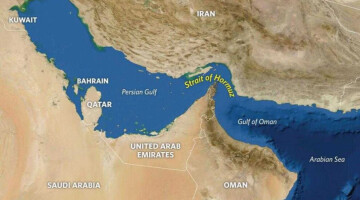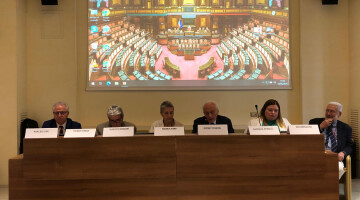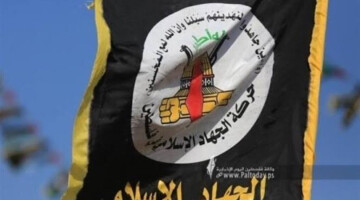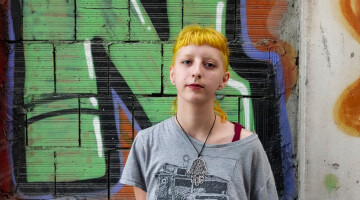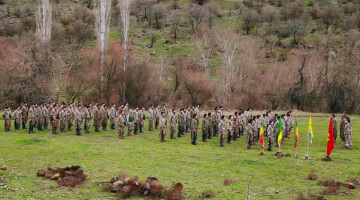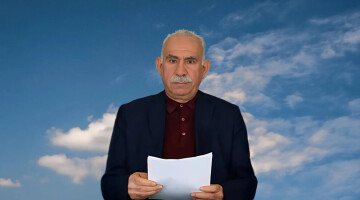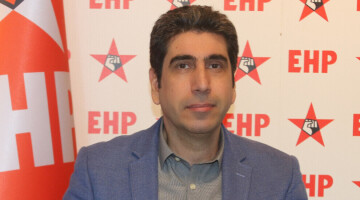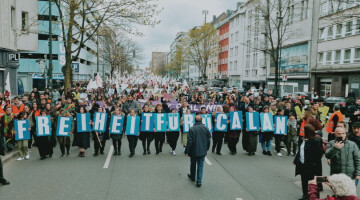With the occupation of the northern Syrian cities of Girê Spî (Tal Abyad) and Serêkaniyê (Ras al-Ain) by Turkey, which was ratified by the U.S. and Russia, about 200,000 Kurds and Arabs from the local population had to leave their homes. The United Nations Office for the Coordination of Humanitarian Affairs (OCHA) reported that 180,000 civilians had fled the region since the beginning of the Turkish invasion on 9 October. The Centre for Strategic Studies Rojava (NRLS), on the other hand, stated that the number of displaced persons exceeds 200,000 and that there are no conditions for returning to the region.
While the invasive attacks on Northern Syria, described by U.S. President Donald Trump as a "two kids in a lot", cost the lives of more than 500 people, including 35 children, the Kurds are being forcibly resettled. 200,000 people from Girê Spî and Serêkaniyê lost their livelihood during the invasion, which Trump tried to legitimize with the words "Oil is safe". In Hesekê, Til Temir, Ain Issa, Raqqa, Kobanê and Qamishlo, displaced people are accommodated in schools, empty courtyards and mosques, facing a new struggle for survival. Some of them live on the streets. They cannot return to their occupied cities. Their houses were plundered by the mercenaries serving the Turkish state.
“We don't want a new home, we already have one and want to return there”
Many of those displaced from Serêkaniyê see the biggest blame for the invasion of Northern and Eastern Syria on the U.S. "We do not want a new home. We already have one, and we want to go back there," they say.
Brahîm Ebid İsmail left his home in Til Hefyan after the attacks on Serêkaniyê. He and his family have nothing left.
Arab citizen Amid Salim comes from the village of Amiriya. He had no financial difficulties before the invasion and now has difficulty finding bread.
Ismail Bilud has a similar situation; all his property has already been plundered by the mercenary proxy army of Turkey. He says: "If there had been no air strikes, we would have stayed. But the real blow came from the U.S. and Russia. The Turks are the lesser of two evils.”
“We will take our home back - there is no alternative”
Imam Mihemed is also one of the many IDPs. "I can't complain about our lives before the attacks. All of us, I mean all peoples and all religious communities, were well", he says and continues: "Trump thinks he has found new living spaces for us. This is our land. It is strange and just as incomprehensible that so many states - including Islamic countries - say nothing to oppose this. Russia has sold Afrin and the U.S. Serêkaniyê. Plans are forged and self-interests pursued at our expense. We are the ones who suffer. We cannot and will not accept that. In any case, we will go back home, there is no alternative."
“UN and the U.S. play the three monkeys”
Mihemed Xidir from Serêkaniyê complains that both the U.S. and the United Nations behave like the three monkeys in the face of the invasion of Rojava and the genocide of the Kurds: "They see nothing, they hear nothing and they say nothing. But we are not afraid and will not leave our homeland to the invaders without further ado," he says.
Fatma Gazi explains that almost the entire population of Serêkaniyê has left the city. But as long as the Turkish state and its gangs are there, we will not be able to return."
Samiha Hemed was able to save her children during the air raids on Serêkaniyê - they are the only thing left of her life. She condemns the agreement between the U.S. and Turkey: "It is an unscrupulous betrayal committed by the U.S. What have these children done? As long as the Turks are in Serêkaniyê we will not get our old lives back. They must leave the city, there is no other way."
Şirin Mistefa Hesen has fled with her clothes on her body, she hasn't had anything else since the war of aggression. She also demands that Turkey and its militias leave Syria: "They have no business here," she says.
"Almost all the inhabitants of Serêkaniyê expelled"
According to a population census in September 2016, 19,704 families lived in the centre of Serêkaniyê back then. "The total population was 100,504," explains Dr. Ahmed Sino of the NRLS. "The city was also considered a safe haven for 9,400 IDPs. In Girê Spî, we have not yet been able to carry out a census, but we assume that the data will be similar."
Ahmed Sino is convinced that Turkey's invasion of Serêkaniyê and Girê Spî follows the same pattern as in Afrin. "The same demographic change is sought to be implemented east of the Euphrates. The Turkish state would use any means at its disposal: massacres, looting and deportation. The people who were killed or expelled are to meant be replaced by gangs and people from Central Asia. That is the plan," says Ahmed Sino.


